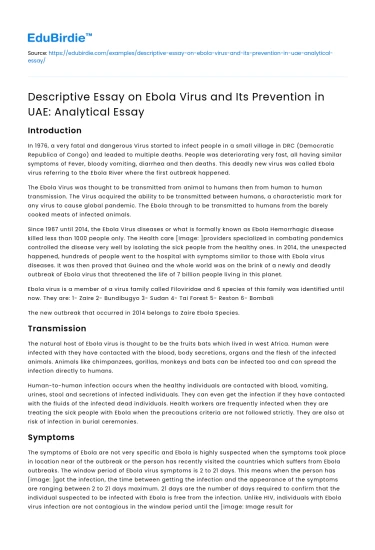Introduction
The emergence of the Ebola virus as a global health threat has necessitated a worldwide commitment to prevention and control strategies. The United Arab Emirates (UAE), one of the hubs of international travel and commerce, has proactively engaged in initiatives to prevent the outbreak within its borders. Despite the UAE's geographical distance from the traditionally affected regions, the rapid international movement of people and goods heightens the potential risk of importation of the virus. This essay aims to analyze the preventative measures adopted by the UAE, assessing their efficacy and identifying areas for improvement. By exploring the country's strategic framework, public health policies, and their application during global health crises, we can evaluate the robustness of its defenses against the Ebola virus.
Strategic Framework and Preparedness
The UAE's strategic framework for preventing Ebola involves a multi-tiered approach, focusing on surveillance, rapid response, and international collaboration. The nation's health authorities, led by the Ministry of Health and Prevention, have implemented stringent surveillance measures at airports and other points of entry. This includes thermal screening of passengers from high-risk areas and mandatory health declarations. According to the World Health Organization (WHO), these measures are crucial in identifying and isolating potential cases before they can proliferate within the community (WHO, 2019).
Save your time!
We can take care of your essay
- Proper editing and formatting
- Free revision, title page, and bibliography
- Flexible prices and money-back guarantee
Beyond surveillance, the UAE has established a rapid response protocol to address potential outbreaks. This involves training healthcare professionals in handling suspected Ebola cases and equipping hospitals with isolation units capable of managing such infections. The strategic allocation of resources, including the stockpiling of personal protective equipment (PPE) and antiviral drugs, underscores the UAE's commitment to preparedness (Ministry of Health and Prevention, 2020). Furthermore, the collaboration with international bodies such as the WHO and Centers for Disease Control and Prevention (CDC) ensures that the UAE remains aligned with global best practices in infectious disease control.
However, the effectiveness of these measures can be debated. Critics argue that while the framework is robust on paper, its practical implementation could face challenges due to the dynamic nature of viral outbreaks and the limitations of existing healthcare infrastructure. Moreover, the reliance on technological solutions, such as thermal imaging, may not always accurately detect asymptomatic carriers. Therefore, continuous evaluation and adaptation of these strategies are essential to maintain their relevance and effectiveness.
Public Health Policies and Community Engagement
In addition to strategic preparedness, the UAE has prioritized public health policies aimed at educating and engaging the community in Ebola prevention efforts. These policies involve widespread awareness campaigns that disseminate information about the virus's transmission, symptoms, and preventive measures. The Ministry of Health and Prevention has utilized various media platforms, including social media, to reach diverse demographic groups, ensuring that accurate information is accessible to all citizens and residents.
Real-life cases highlight the significance of community engagement in preventing outbreaks. For instance, during the 2014-2016 Ebola epidemic in West Africa, countries that effectively mobilized community resources were more successful in curtailing the spread of the virus (CDC, 2016). The UAE can draw lessons from these cases, emphasizing the role of community health workers and local leaders in fostering trust and encouraging compliance with health advisories.
Despite these efforts, there remains a counter-argument regarding the adequacy of public health policies in engaging hard-to-reach populations, such as migrant workers who may lack access to health information due to language barriers. Addressing these gaps through targeted outreach programs and multilingual resources can significantly enhance the inclusivity and efficacy of the UAE's public health strategy.
International Collaboration and Future Implications
The UAE's commitment to international collaboration plays a pivotal role in its Ebola prevention strategy. By participating in global health initiatives and contributing to international aid efforts, the nation not only fortifies its defenses but also assists in controlling outbreaks at their source. The UAE's financial and logistical support during previous Ebola crises exemplifies its dedication to global health security (Emirates News Agency, 2019).
Looking towards the future, the UAE must continue to strengthen its collaborative ties with international organizations to enhance its capacity for rapid response and innovation in disease prevention. This includes investing in research and development for novel diagnostic tools and vaccines, as well as participating in international forums that shape the global health agenda.
However, the challenge lies in balancing international collaboration with national interests. While the UAE's proactive stance in global health is commendable, it must ensure that its domestic healthcare needs are not overshadowed by international commitments. Continuous investment in local healthcare infrastructure and workforce development is essential to maintain a resilient and responsive health system capable of handling future pandemics.
Conclusion
In conclusion, the UAE has established a comprehensive framework for Ebola virus prevention, characterized by strategic preparedness, public health policies, and international collaboration. While these measures have been effective in mitigating the risk of importation and transmission, there are areas that require continuous evaluation and enhancement. Addressing challenges in practical implementation, community engagement, and balancing international and domestic priorities will be crucial for the UAE to maintain its robust defenses against the Ebola virus. Ultimately, the UAE's experience serves as a valuable model for other nations seeking to bolster their preparedness against global health threats.






 Stuck on your essay?
Stuck on your essay?

